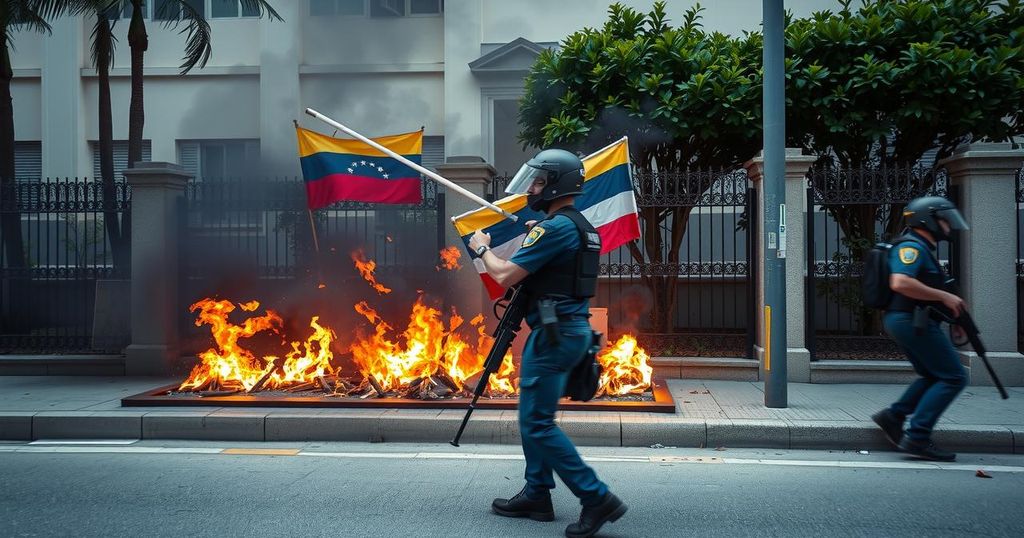Six Venezuelan political opponents encamped at the Argentine embassy in Caracas decried harassment by police outside, prompting U.S. and Argentine condemnation for violations of international law. Allegations of a new siege against them coincide with calls for political mobilization by opposition leader María Corina Machado. The tense political atmosphere continues to challenge the asylum-seekers’ safety and international diplomatic relations.
In an alarming turn of events, six Venezuelan political opponents taking refuge at the Argentine embassy in Caracas expressed their concerns over the presence of local police and intelligence agents stationed outside the embassy for extended hours. This development was condemned by the U.S. government, which characterized it as a serious contravention of international law, while Argentina’s Foreign Ministry labeled it as an act of harassment.
Most of the embattled opponents are affiliated with the Vente Venezuela party, led by former legislator María Corina Machado. They decried what they described as “a new siege by hooded officials” that commenced on Saturday night and continued into Sunday. The tense situation unfolded just hours after Machado had publicly urged for a large-scale mobilization scheduled for December 1. In response, the Venezuelan Minister of the Interior accused Machado of conspiring against the administration of President Nicolas Maduro.
Vente Venezuela issued a statement claiming that the diplomatic facility lacked electricity and was encircled by “regime vehicles,” which impeded traffic flow in the surrounding area. The statement further alleged that communication signals had been disrupted. Argentina’s Foreign Ministry subsequently expressed that the armed troop deployment and street closures nearby represented a significant breach of security. It urged the international community to denounce these actions, a call that the United States supported wholeheartedly.
On social media, the U.S. Embassy in Venezuela expressed strong condemnation of the acts directed at asylum-seekers, asserting, “The deployment of armed forces and blockades seriously violate international law. We demand that the Venezuelan regime respect its international obligations, cease these intimidating actions, and guarantee safe passage for asylum-seekers.”
Diplomatic relations between Venezuela and Argentina have remained strained since 2019. The opposition figures entered the embassy in March following the issuance of arrest warrants by the Venezuelan Attorney General’s Office, accusing them of inciting violent acts aimed at destabilizing the government. In August, Brazil accepted Argentina’s appeal to protect its embassy after Venezuelan authorities expelled Argentine diplomatic personnel in light of President Javier Milei’s remarks regarding Venezuela’s elections. Amid escalated tensions, Venezuela later revoked Brazil’s protective authorization, claiming evidence of potential terrorist activities planned from within the embassy.
The current incident highlights the ongoing struggles faced by political opponents to the Venezuelan government, reflecting the broader political crisis within the country. Since 2019, Venezuela’s diplomatic relations with several nations, notably Argentina and Brazil, have deteriorated, marked by accusations and counter-accusations of interference and conspiracy. Political asylum seekers, especially from the opposition, are faced with increasing hostility, as evidenced by aggressive actions taken against them by government forces.
In conclusion, the recent actions of Venezuelan police and intelligence agents outside the Argentine embassy represent a significant escalation in the government’s campaign against political dissent. The marked condemnation from both Argentina and the United States reinforces the gravity of the situation and calls for respect for international law regarding the treatment of asylum-seekers. The ongoing tensions underline the dire political climate in Venezuela and the precarious position of those opposing the current regime.
Original Source: www.voanews.com






